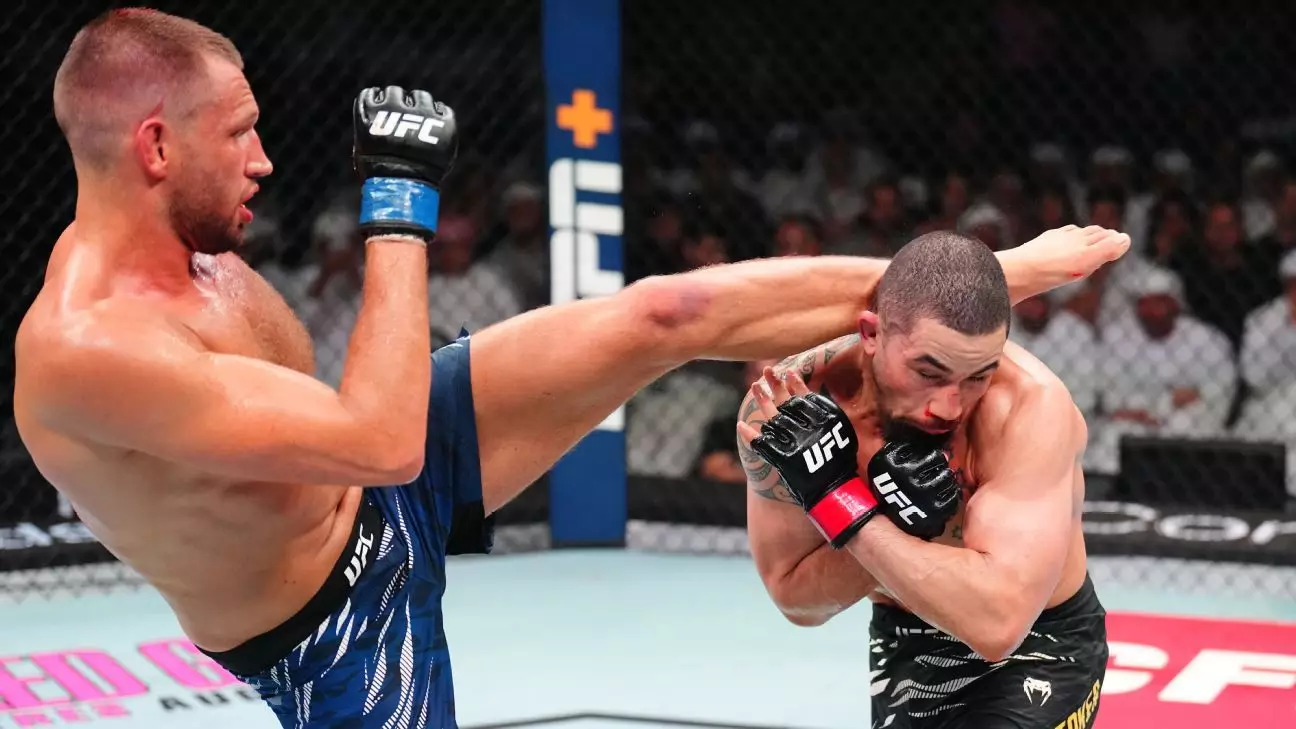In a compelling display of determination and skill, Reinier de Ridder has positioned himself as a genuine contender in the UFC’s highly competitive middleweight division. His recent split-decision victory over veteran superstar Robert Whittaker at UFC Fight Night in Abu Dhabi underscores both his growing prowess and the brutal realities of mixed martial arts. While the official scorecards favored de Ridder narrowly, the fight’s story told a different tale—one of volume, dominance, and unyielding pressure. His performance marks more than a single win; it symbolizes a strategic evolution and a declaration of intent within a division long monopolized by established giants.
De Ridder, a Dutch-born grappler now training in Florida, distinguished himself by outstriking and controlling the fight in ways that defied the close split decision. Landing a staggering 169 strikes compared to Whittaker’s 100, and maintaining nearly nine minutes of control time, showcased his relentless pace and tactical intelligence. These numbers are a testament to his crisp execution, especially considering Whittaker’s resilience and power, which nearly turned the tide with a well-timed knockdown. Although Whittaker momentarily stunned de Ridder in the third round, the fight essentially belonged to the Dutch fighter, whose pressure wore down one of the sport’s most durable and feared fighters.
This win isn’t just about the numbers; it signifies a paradigm shift. De Ridder, primarily regarded as a submission specialist, demonstrated his ability to impose his wrestling and striking game plan effectively against an elite opponent. His hard-fought victory throws into sharp relief how the UFC’s middleweight landscape is evolving—where grit and volume can sometimes trump raw power, and well-roundedness is increasingly vital. For de Ridder, this fight reaffirms that he belongs among the division’s upper echelons, earning him a foothold that could soon lead to a title shot.
Shifting the Power Dynamics and Future Challenges
Despite the closeness of the judges’ scores, the fight’s actual flow challenged the perception of who was truly in control. Whittaker’s best moment—a perfectly timed counter right that dropped de Ridder—highlighted his striking prowess and fighting IQ. Yet, the resilience de Ridder displayed in surviving that danger and comprehensively winning the subsequent rounds signals a fighter with mental toughness and adaptability—traits essential for championship contenders.
This victory also raises questions about the future landscape of the middleweight division. De Ridder’s immediate call-out of the winner between Dricus Du Plessis and Khamzat Chimaev is bold but justified. He recognizes that his best shot at gold might come from facing a champion or top contender who can withstand and is vulnerable to his relentless pressure. Notably, de Ridder is currently ranked No. 13, an underdog position that he intends to turn into an advantage. His recent wins, including victories over high-caliber fighters like Kevin Holland and Bo Nickal, bolster his claim that he’s ripe for a significant step forward.
Whittaker, on the other hand, faces a period of reflection. The loss marks his first back-to-back defeats since 2013, raising doubts about his title contention standing. Yet, “The Reaper” remains a fan favorite and a proven talent. His resilience and experience mean he will eventually rebound, but his current setbacks serve as stark reminders of how unforgiving the UFC can be—especially against fighters like de Ridder, who bring a multifaceted skill set to the cage.
In essence, this fight was a microcosm of the division’s evolution—where fighters are no longer relying solely on knockout power or submission skills but are instead embracing a hybrid approach that values volume, pressure, and strategic control. Reinier de Ridder’s victory signifies this shift. It challenges the old guard, forces established contenders to rethink their strategies, and injects fresh energy into a division crying out for new blood. The question now isn’t just about when he’ll get the title shot, but whether the UFC recognizes the potential of fighters like de Ridder early enough to capitalize on their ascendancy—and whether the division is ready to embrace a new era dominated by relentless, well-rounded warriors.

